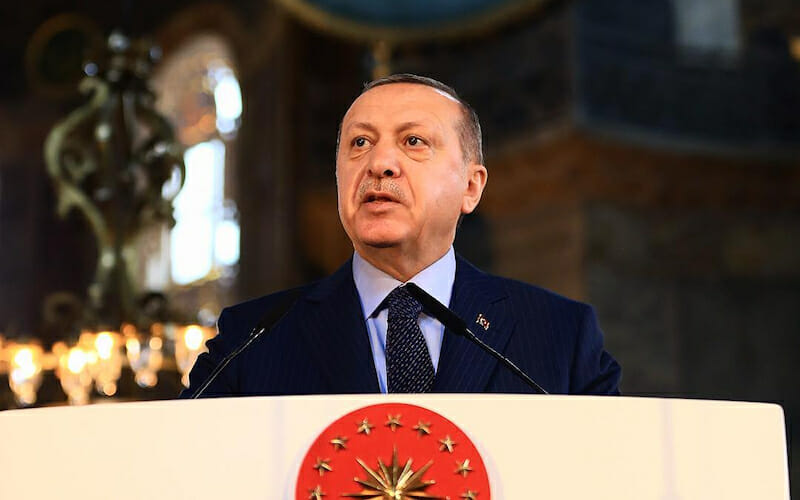
Which Actors are Pleased with Erdogan’s Victory?
While serious questions are being had domestically as to how and why Recep Tayyip Erdogan’s ruling Justice and Development Party (AKP) held onto power, beyond Turkey’s borders, the fundamental question is which states and non-state actors in the region were pleased by Erdogan’s victory.
Below is a primer on the various actors and states who are relieved that Erdogan held onto power.
Hamas
Khaled Mashaal, a senior Hamas official, praised Turkish control over Afrin in Syria and the invasion of the Turkish army. He had said “victory in Afrin is a symbol of Turkey will. If God wills, we will submit great epics to help our people.” He mentioned earlier at a AKP conference that Erdogan is the leader of the Islamic world. During the fourth AKP conference in Ankara, he described the AKP as a symbol of “modern” and “moderate” Islam and said “O people of Turkey! Be honored of the Justice and Development Party, which is a great symbol of success.”
Erdogan has also emphasized several times that Hamas is a party, not a terrorist group. A number of Hamas members have lived in Turkey in recent years.
Turkey’s opposition parties, especially the Republican People’s Party, have always warned about the closeness of the AKP to Hamas. The current CHP leader, Kemal Kılıçdaroğlu, has stated that Turkey should distance itself from Iran and Hamas, since contact with Hamas can offer nothing positive for his country. The then party’s Vice Chairman, Onur Öymen, remarked that “Turkey cannot support a group, the political ideology of which is jihad and has as its main purpose the obliteration of Israel from the map.”
Muslim Brotherhood
Since the revolution in Egypt, Turkey has become the regional hub for the Muslim Brotherhood. Istanbul has played host to several Brotherhood meetings about what steps are to be taken against the military-backed Egyptian government after the ouster of President Mohammad Morsi.
Turkey’s defense of the Muslim Brotherhood, and Erdogan’s condemnation of Egyptian security forces when they attempted to storm the sit-in of Rabaa al-Adawiya, highlights Erdogan’s ties with the Muslim Brotherhood and their mutual interest in restoring “the era of Islamic rule,” seen by the Brotherhood as the basis for protecting “the Islamic nation.”
Qatar
During recent years, Qatar was grateful to Turkey as it sent basic food stuffs, namely juice, milk, yogurt, etc., to Qatar during the economic blockade by Saudi Arabia.
Erdogan had earlier called Qatar’s siege by Saudi Arabia inhuman and contrary to Islamic values. Besides the extensive economic relations between Qatar and Turkey, their leaders also have common political views.
Neither classifies the Muslim Brotherhood nor Hamas as “terrorist organizations”; both have condemned the military coup in Egypt that toppled Mohammed Morsi; and both have supported Islamist groups in their attempt to overthrow Bashar al-Assad’s regime in Syria.
They also share views towards Iran. Both acknowledge that it is one of the key players in the region and try to maintain good ties.
Qatar has also been investing heavily in Turkey – it ranks seventh in terms of Doha’s foreign investments. Turkish exports to Qatar are valued at more than $420 million, and the emirate is seeking several arms deals with Turkish defense firms.
The value of projects undertaken in Qatar by more than 30 Turkish companies, mainly in the construction sector, has reached approximately $8 billion to date, according to official numbers
Iran and Russia
The Qatar crisis drew Iran and Turkey closer together. Although Qatar and Turkey have supported groups opposing al-Assad in Syria, it seems that Turkey, Iran, and Qatar are supporting Hamas. Turkish and Iranian relations with Israel; and Turkey turning to the East, especially to Moscow have resulted in a greater bond between Tehran and Ankara. Therefore, clones of Tehran, Moscow and Turkey support of Syrian rebels has decreased.
Cooperating with Russia and Iran, Turkey was determined to support the peace process as a diplomatic solution instead of the Geneva talks to solve the Syria problem in recent months. The purpose of all three countries – Iran, Russia, and Turkey – was to marginalize the West in Syria.
Taking control of Afrin and Turkey’s goal to capture Manbij, Turks are not determined to support the Syrian Islamist opposition against al-Assad in another clear repositioning, as they did previously, They are happy with their share in Syria provided by Russia.
Russia and Turkey are also developing mutual economic cooperation. Turkey’s desire to get the S-400 missile system from Russia is at the top of this economic cooperation list. Russia’s promise to Turkey regarding establishing a nuclear power plant, built by Russians in the vicinity of Mersin Province-Turkey, as well as creating a direct gas transmission pipeline between Turkey and Russia passing through the black sea are some examples of Russian and Turkish plans to boost their cooperation. Russia might also begin military and technologic development with Ankara.
A quick glance at Turkey tourism shows that, despite reduction of European and American tourists to Turkey, Iranian and Russians tourism increased in Turkey during recent months.
How Turkey translates this goodwill into further cementing regional alliances remains to be seen.

